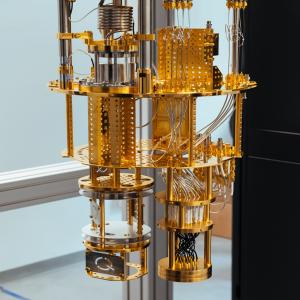THE FIRST IQM QUANTUM COMPUTER IN ITALY IS TURNED ON IN TURIN
TURIN, ITALY, May 22, 2025 /EINPresswire.com/ -- This morning, the first IQM quantum computer in Italy (there are only 12 in the whole world), was officially activated. It marks a significant step that will place the region at the forefront of quantum technologies in Europe, a field poised to redefine computing in the coming years.
The five-qubit quantum computer, available to the world of research, industry and academia, acquired thanks to a partnership between Politecnico di Torino, Fondazione LINKS (an instrumental entity of the Compagnia di San Paolo Foundation), and INRiM - National Institute of Metrological Research. The system has been installed in the data center of the Polytechnic University of Turin and was supplied by IQM Quantum Computers, a global leader in quantum computer development.
Quantum computers, which operate based on the principles of quantum physics, represent a radical shift in the research landscape. Unlike traditional computers that rely on bits, quantum computers use qubits (quantum bits). Processing in such computers is not based on the binary states (on or off) of traditional digital circuits. While the bits as we know them can only be 0 or 1, qubits have all the intermediate values at the same time, each one with a different probability (principle of superposition). Combining this capability of qubits with machine learning — the subject of Quantum Machine Learning — makes it possible to perform many operations simultaneously, enabling the efficient exploration of an exponentially complex search space.
Compared to traditional High-Performance Computing (HPC) systems, quantum computers can perform more complex calculations significantly faster and with much lower energy consumption. This revolutionary capability is expected to drive major innovation in strategic sectors such as cryptography, cybersecurity, artificial intelligence, finance, pharmacology, logistics and distribution, and many more.
This is a very complex and delicate instrumentation. The installed machine is equipped with an advanced cryogenic system that operates at a temperature of approximately 20 millikelvin, close to absolute zero (-273.15°C) and approximately 1/100 of the deep space temperature. This extremely low temperature is essential to maintain the quantum coherence of the qubits. Inside the cryostat, an ultra-isolated and tightly controlled environment is created to provide the ideal conditions for the operation of extremely sensitive quantum circuits.
The entire system occupies an area of about 4 square meters and stands 3 meters tall. Its core section is enclosed in shielding that protects the delicate environment from vibrations and electromagnetic interference.
This project thus represents a major advancement for research, industry, and academia. It builds upon the existing expertise of the initiative’s partners, who collectively bring together more than 30 experts — including faculty members, researchers, and PhD candidates — working in the field. In addition, over 60 students have already participated in the Master’s program in Quantum Computing or enrolled in the Quantum Engineering course at the Politecnico di Torino since 2023, reflecting growing interest in this new computing paradigm.
Thanks to the acquisition of an on-site quantum machine, it will now be possible to carry out activities and services using a real quantum computer, without having to rely on simulators or remote systems, which may be less accessible or involve higher costs.
Numerous expressions of interest and requests for participation have already come from leading industrial players and associations in the region. The entire initiative aims to generate a significant impact on the local ecosystem and aligns with the latest strategic guidelines of both the Italian government and the European Union.
“The goal of our Polytechnic ecosystem is to create a first hub where academia and innovation centers work together, in such a way as to make this technology usable and exportable to industry activities towards society – comments the Rector of the Politecnico Stefano Corgnati - We represent one of the first Italian applications that use this type of technology: for us, this is an important aspect because on the one hand it allows us to build innovative training paths, on the other it allows us to systematize these new scientific trajectories with the industrial fabric of the Italian system and the Piedmont system. It also strengthens the collaboration with Links and INRiM, consolidating a fundamental partnership on complementary research themes”.
“By adopting a systemic perspective and working alongside other national and European players active in this technological field, we can attract to Turin projects, corporate competence centers, and, of course, talented individuals — people committed to study and carry out research on this emerging computing paradigm," said Marco Cantamessa, President of Fondazione LINKS.
"What is particularly relevant for LINKS," added Stefano Buscaglia, General Manager of Fondazione LINKS, "is the evidence that this initiative is already receiving attention and interest from several industrial partners. As a result, more companies — guided by our researchers —are beginning to engage with this new computational paradigm, which offers radically different ways of solving previously intractable technical problems, from finance to materials science, from logistics to cryptography.
“We chose to participate in this initiative because INRiM is committed to developing innovative measurement tools to improve the performance of superconducting qubits, one of the most promising technological approaches for quantum computers. Despite significant progress, these systems are still limited by errors and loss of coherence: INRIM is working to identify the causes and overcome them, developing advanced measurement techniques and protocols shared at European level. Our scientific contribution aims to make quantum computers more reliable and efficient, accelerating their evolution and expanding their applications, from fundamental research to industry" - says Pietro Asinari, President of the National Institute for Metrological Research (INRiM)
“Italy has a great potential in the quantum field, and our collaboration with LINKS represents a significant step forward in strengthening the quantum ecosystem, particularly in the Piedmont region. We believe that our support and our technology will provide further momentum to research,” sais Mikko Välimäki, Co-CEO of IQM Quantum Computers
Agenzia di stampa Italpress Srl
ITALPRESS
+ +39 091 589674
email us here
Legal Disclaimer:
EIN Presswire provides this news content "as is" without warranty of any kind. We do not accept any responsibility or liability for the accuracy, content, images, videos, licenses, completeness, legality, or reliability of the information contained in this article. If you have any complaints or copyright issues related to this article, kindly contact the author above.
Global Youth Leaders Unite in Cape Town to Champion Compassion, Ubuntu, and Interfaith Action at Youth IF20
Captain Compliance Launches On-Prem AI Tools via OpenAI's GPT-OSS to Power Advanced Data Privacy & Regulatory Automation
Ferguson Law Firm’s Cody Dishon Secures Texas’ #1 Medical Malpractice Verdict and Earns Top Verdict Honor
Więcej ważnych informacji
 Jedynka Newserii
Jedynka Newserii

 Jedynka Newserii
Jedynka Newserii

Ochrona środowiska

A. Bryłka (Konfederacja): Ograniczenie emisyjności nie musi się odbywać za pomocą celów klimatycznych. Są absurdalne, nierealne i niszczące europejską gospodarkę
W lipcu br. Komisja Europejska ogłosiła propozycję nowego celu klimatycznego, który zakłada ograniczenie emisji gazów cieplarnianych o 90 proc. do 2040 roku w porównaniu do stanu z 1990 roku. Został on zaproponowany bez zgody państw członkowskich, w przeciwieństwie do poprzednich celów na 2030 i 2050 rok. Polscy europarlamentarzyści uważają ochronę środowiska i zmiany w jej zakresie za potrzebne, jednak nie powinny się odbywać za pomocą nieosiągalnych celów klimatycznych.
Polityka
Dramatyczna sytuacja ludności w Strefie Gazy. Pilnie potrzebna dobrze zorganizowana pomoc humanitarna

Według danych organizacji Nutrition Cluster w Strefie Gazy w lipcu br. u prawie 12 tys. dzieci poniżej piątego roku życia stwierdzono ostre niedożywienie. To najwyższa miesięczna liczba odnotowana do tej pory. Mimo zniesienia całkowitej blokady Strefy Gazy sytuacja w dalszym ciągu jest dramatyczna, a z każdym dniem się pogarsza. Przedstawiciele Polskiej Akcji Humanitarnej uważają, że potrzebna jest natychmiastowa pomoc, która musi być dostosowana do aktualnych potrzeb poszkodowanych i wsparta przez stronę izraelską.
Polityka
Wśród Polaków rośnie zainteresowanie produktami emerytalnymi. Coraz chętniej wpłacają oszczędności na konta IKE i IKZE

Wzrosła liczba osób, które oszczędzają na cele emerytalne, jak również wartość zgromadzonych środków. Liczba uczestników systemu emerytalnego wyniosła w 2024 roku ponad 20,8 mln osób, a wartość aktywów – 307,5 mld zł – wynika z najnowszych danych Urzędu Komisji Nadzoru Finansowego (UKNF). Wyraźny wzrost odnotowano w przypadku rachunków IKE i IKZE, na których korzyść działają m.in. zachęty podatkowe. Wpłacane na nie oszczędności są inwestowane, a tym samym wspierają gospodarkę i mogą przynosić atrakcyjną stopę zwrotu.
Partner serwisu
Szkolenia

Akademia Newserii
Akademia Newserii to projekt, w ramach którego najlepsi polscy dziennikarze biznesowi, giełdowi oraz lifestylowi, a także szkoleniowcy z wieloletnim doświadczeniem dzielą się swoją wiedzą nt. pracy z mediami.







.gif)

 |
| |
| |
|